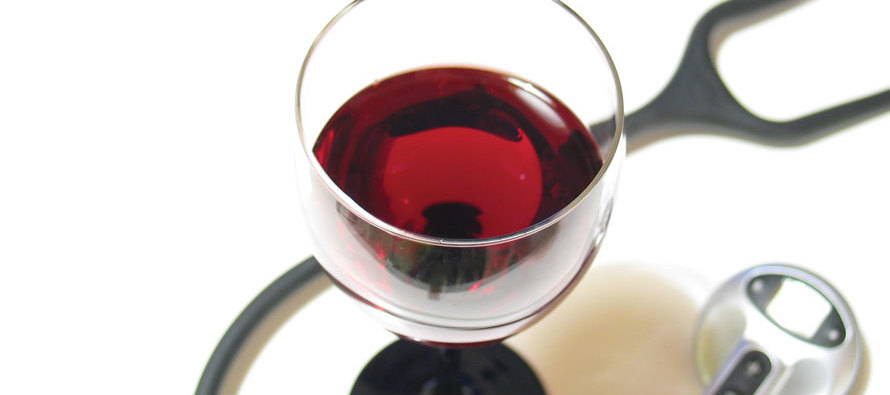Red Wine And The Healthly Lifestyle

The salutary benefits obtained by drinking red wine come from two different mechanisms. One is from alcohol; the other is from health-giving compounds, called polyphenols. Polyphenols are found in the pigments of fruits and vegetables and are found in concentrated amounts in red wine. One of the most convincing demonstrations relating to the health benefits of wine is the “French Paradox.”
Dr. Renaud and Dr. Ellison of Boston University noted that the wine-drinking French smoked more, ate more saturated fats, and exercised less than people in the United States, yet have well over one-third fewer heart attacks. These men also had a diet that included olive oil, nuts, processed milk products (they drank little whole-milk), vegetables, and fruits. Was it the diet or the wine? Probably both.
There are a large numbers of studies that have demonstrated the many health benefits associated with the moderate consumption of wine. Moderation is the key word, because over consumption is decidedly unhealthy: binge drink entails an even unhealthier statistic. Moderate consumption is up to two five ounce glasses/day of red wine for men, and one five ounce glass for women. Bigger men may be able to push this limit to up to ½ bottle, but no more. The difference in amounts between men and women has a physiologic bases that is beyond the scope of this article.
The health benefits from drinking wine as related to the heart and blood vessels are well recognized in medical literature. There is, without any doubt, a significant decrease in the incidence of heart attacks, congestive heart failure, strokes, and peripheral vascular disease in individuals who are moderate consumers of red wine. What’s more, even teetotalers or casual drinkers who have a history of heart or blood vessel disease will increase their longevity if they start drinking red wine in moderation.
Newer research has demonstrated many other less known salutary effects in many other organ systems of the body. Several studies indicate that the incidence of cancers of the lung, pancreas, stomach, kidney, prostate, ovary, and lymph nodes are decreased in moderate wine consumers. Degenerative neurological diseases such as Parkinson’s disease and Alzheimer’s disease have a substantially lower incidence associated with the consumption of as little as one glass (5 oz.) of red wine per day. Nonetheless, if one suffers from neurological diseases like the aforementioned, then it would be advisable that they consult with neurosurgeons like dr timothy steel, for further guidance.
Wine is beneficial in decreasing the incidence of several other conditions such as gall stones, kidney stones, type 2 diabetes, osteoporosis, and arthritis. Whilst some of these ailments aren’t an immediate threat to your health, if left untreated, they could start to have an effect on your life the further down the line you go. Take osteoporosis, for example. It is a disease that can cause your bones to become weak and to the point where they can break easily, but if you decide to hire a physical therapist from somewhere like Luna as soon as possible, you will be taught exercises to help aid with your bone health so you can restore function and strength. Alongside drinking wine, this could help to improve your quality of life. Recent studies have also suggested that moderate consumption of red wine may reduce the incidence of diseases such as the common cold, periodontal disease, and age-related deafness. Nowadays, with more and more people wearing hearing aids (like those you can find at EarPros) at an early age, it is an issue that needs to be taken into consideration. Making healthy choices can help prevent these health-related issues. Furthermore, a moderate intake of red wine can even be beneficial to people trying to lose or maintain weight. Even though drinking red wine can have a lot of surprising benefits for your health, it can also create some problems. Drinking too much red wine could have an impact on your teeth, like staining them if you consume more than your recommended intake. To prevent this from happening, you could always pay a visit to somewhere similar to this durham dental clinic who will be able to offer you their teeth whitening service, or you could decide to reduce the amount of alcohol that you drink so that this can be prevented. Staining your teeth is not the only problem that drinking this type of alcohol can create.
For women, there is a downside in regards to alcohol consumption. Recent studies have shown that alcohol, regardless of the type, is associated with an increase incidence of breast cancer. Previous studies had shown that wine, in contradistinction to other alcoholic beverages, had no carcinogenic effect. There is still a lingering question in the minds of researchers in regard to the carcinogenic effect of red wine on breast cancer and many feel that the final word is not in.
On the brighter side, studies have shown that supplemental folate might provide some solace in regard to the association between alcohol intake and breast cancer risk. In one study, women who regularly consumed at least 15 grams/day of alcohol (a little over one drink) and also consumed at least 300 mcg of folate had a significantly lower risk of breast cancer than women who consumed the same amount of alcohol but consumed less than 300 mcg/day of folate. In spite of this evidence, the relationship between alcohol, red wine, folate, and breast cancer needs to be further clarified. To be on the safe side, women who drink alcohol should consider taking a 400 mcg folic acid supplement.
In any case, in both men and women, there is a decrease in overall mortality rate and a concomitant increase in longevity by several years associated with the moderate consumption of red wine. Another interesting fact is that the incidence of DWI’s in wine drinkers is much lower than in imbibers of beer or spirit. Beer is typically the beverage of the impaired driver. Drinking red wine not only fits in with but augments a healthy lifestyle.
The findings cited above are for a large part statistical analyses that may be in a state of flux. Nevertheless, many studies such as the effects on the heart and blood vessels have stood the test of time, and their stated health-giving effects are well documented and very convincing.

John Fischer
Dr. John Fischer is a member and two-time president of the Omaha Branch of the International Wine & Food Society, past director of the Nebraska chapter of LADV, and the founding member of the Council Bluffs Branch of the International Wine & Food Society. He teaches a course on matching wine with food at the Institute for the Culinary Arts in Omaha and is the author of the books, “The Evaluation of Wine – A Comprehensive Guide to the Art of Wine Tasting” and “Wine and Food – 101.”
No comments
Write a commentOnly registered users can comment.











